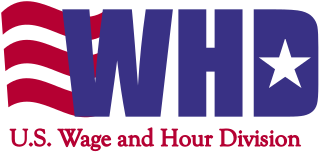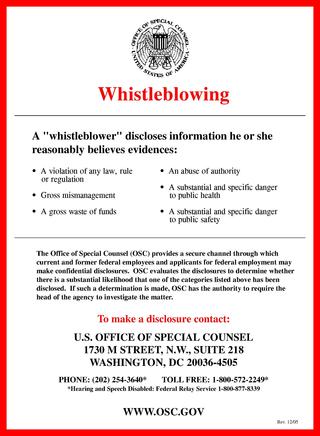In employment law, constructive dismissal, also called constructive discharge or constructive termination, occurs when an employee resigns as a result of the employer creating a hostile work environment. Since the resignation was not truly voluntary, it is, in effect, a termination. For example, when an employer places extraordinary and unreasonable work demands on an employee to obtain their resignation, this can constitute a constructive dismissal.
In United States labor law, at-will employment is an employer's ability to dismiss an employee for any reason, and without warning, as long as the reason is not illegal. When an employee is acknowledged as being hired "at will", courts deny the employee any claim for loss resulting from the dismissal. The rule is justified by its proponents on the basis that an employee may be similarly entitled to leave their job without reason or warning. The practice is seen as unjust by those who view the employment relationship as characterized by inequality of bargaining power.

The Consolidated Omnibus Budget Reconciliation Act of 1985 (COBRA) is a law passed by the U.S. Congress on a reconciliation basis and signed by President Ronald Reagan that, among other things, mandates an insurance program which gives some employees the ability to continue health insurance coverage after leaving employment. COBRA includes amendments to the Employee Retirement Income Security Act of 1974 (ERISA). The law deals with a great variety of subjects, such as tobacco price supports, railroads, private pension plans, emergency department treatment, disability insurance, and the postal service, but it is perhaps best known for Title X, which amends the Internal Revenue Code and the Public Health Service Act to deny income tax deductions to employers for contributions to a group health plan unless such plan meets certain continuing coverage requirements. The violation for failing to meet those criteria was subsequently changed to an excise tax.

The Family and Medical Leave Act of 1993 (FMLA) is a United States labor law requiring covered employers to provide employees with job-protected, unpaid leave for qualified medical and family reasons. The FMLA was a major part of President Bill Clinton's first-term domestic agenda, and he signed it into law on February 5, 1993. The FMLA is administered by the Wage and Hour Division of the United States Department of Labor.

Mental health law includes a wide variety of legal topics and pertain to people with a diagnosis or possible diagnosis of a mental health condition, and to those involved in managing or treating such people. Laws that relate to mental health include:

United States labor law sets the rights and duties for employees, labor unions, and employers in the United States. Labor law's basic aim is to remedy the "inequality of bargaining power" between employees and employers, especially employers "organized in the corporate or other forms of ownership association". Over the 20th century, federal law created minimum social and economic rights, and encouraged state laws to go beyond the minimum to favor employees. The Fair Labor Standards Act of 1938 requires a federal minimum wage, currently $7.25 but higher in 29 states and D.C., and discourages working weeks over 40 hours through time-and-a-half overtime pay. There are no federal laws, and few state laws, requiring paid holidays or paid family leave. The Family and Medical Leave Act of 1993 creates a limited right to 12 weeks of unpaid leave in larger employers. There is no automatic right to an occupational pension beyond federally guaranteed Social Security, but the Employee Retirement Income Security Act of 1974 requires standards of prudent management and good governance if employers agree to provide pensions, health plans or other benefits. The Occupational Safety and Health Act of 1970 requires employees have a safe system of work.
California's Paid Family Leave (PFL) insurance program, which is also known as the Family Temporary Disability Insurance (FTDI) program, is a law enacted in 2002 that extends unemployment disability compensation to cover individuals who take time off work to care for a seriously ill family member or bond with a new minor child. If eligible, you can receive benefit payments for up to eight weeks. Payments are about 60 to 70 percent of your weekly wages earned 5 to 18 months before your claim start date. You will receive payments by debit card or check. Benefits equal approximately 70% of earnings and have a maximum per week, for a total of up to six weeks.

The Worker Adjustment and Retraining Notification Act of 1988 is a U.S. labor law that protects employees, their families, and communities by requiring most employers with 100 or more employees to provide 60 calendar-day advance notification of planned closings and mass layoffs of employees. In 2001, there were about 2,000 mass layoffs and plant closures that were subject to WARN advance notice requirements and that affected about 660,000 employees.

The Uniformed Services Employment and Reemployment Rights Act of 1994 was passed by U.S. Congress and signed into law by U.S. President Bill Clinton on October 13, 1994 to protect the civilian employment of active and reserve military personnel in the United States called to active duty. The law applies to all United States uniformed services and their respective reserve components.
Sick leave is paid time off from work that workers can use to stay home to address their health needs without losing pay. It differs from paid vacation time or time off work to deal with personal matters, because sick leave is intended for health-related purposes. Sick leave can include a mental health day and taking time away from work to go to a scheduled doctor's appointment. Some policies also allow paid sick time to be used to care for sick family members, or to address health and safety needs related to domestic violence or sexual assault. Menstrual leave is another type of time off work for a health-related reason, but it is not always paid.
Nevada Department of Human Resources v. Hibbs, 538 U.S. 721 (2003), was a United States Supreme Court case which held that the Family and Medical Leave Act of 1993 was "narrowly targeted" at "sex-based overgeneralization" and was thus a "valid exercise of [congressional] power under Section 5 of the Fourteenth Amendment."
Mother's rights are the legal obligations for expecting mothers, existing mothers, and adoptive mothers in the United States. Issues that involve mothers' rights include labor rights, breast feeding, and family rights.
Hoffman Plastic Compounds, Inc. v. National Labor Relations Board, 535 U.S. 137 (2002), is a United States labor law decision in which the Supreme Court of the United States denied an award of back pay to an illegal immigrant worker, Jose Castro, who had been laid off for participating in a union organizing campaign at Hoffman Plastics Compounds plant, along with several other employees. The case was originally filed against Hoffman by Dionisio Gonzalez, an organizer with the United Steelworkers.
Christensen v. Harris County, 529 U.S. 576 (2000), is a Supreme Court of the United States case holding that a county's policy of requiring employees to schedule time off to avoid accruing time off was not prohibited by the Fair Labor Standards Act.

The Wage and Hour Division (WHD) of the United States Department of Labor is the federal office responsible for enforcing federal labor laws. The Division was formed with the enactment of the Fair Labor Standards Act of 1938. The Wage and Hour mission is to promote and achieve compliance with labor standards to protect and enhance the welfare of the Nation's workforce. WHD protects over 144 million workers in more than 9.8 million establishments throughout the United States and its territories. The Wage and Hour Division enforces over 13 laws, most notably the Fair Labor Standards Act and the Family Medical Leave Act. In FY18, WHD recovered $304,000,000 in back wages for over 240,000 workers and followed up FY19, with a record-breaking $322,000,000 for over 300,000 workers.

A whistleblower is a person who exposes any kind of information or activity that is deemed illegal, unethical, or not correct within an organization that is either private or public. The Whistleblower Protection Act was made into federal law in the United States in 1989.
Parental leave in the United States is regulated by US labor law and state law. The Family and Medical Leave Act of 1993 (FMLA) requires 12 weeks of unpaid leave annually for mothers of newborn or newly adopted children if they work for a company with 50 or more employees. As of October 1, 2020, the same policy has been extended to caregivers of sick family members, or a partner in direct relation to the birth of the child therefore responsible for the care of the mother. Although 12 weeks are allowed to them, on average American fathers only take 10 days off, due to financial need. Taking paternity leave is not the norm, due to lack of paternity leave allotted to fellow employees previously in the same situation since the policy change is relatively new. Beginning in 2020, California, New Jersey, and Rhode Island required paid parental leave to employees, including those a part of 50 or less employees. For the majority of US workers at companies with fewer than 50 employees, there is no legal requirement for paid or unpaid leave to care for a new child or recover from childbirth but some US states do require this.
Joint employment is the sharing of control and supervision of an employee's activity among two or more business entities.
Sure-Tan, Inc. v. National Labor Relations Board, 467 U.S. 883 (1984) is a US labor law case that resulted in a split decision before the US Supreme Court. By a 7-2 majority, the Court ruled that undocumented immigrant workers were “employees” covered by the National Labor Relations Act (NLRA). However, by a 5-4 majority the Court ruled that the National Labor Relations Board (NLRB) was limited in its remedies for penalizing employers who fired undocumented workers for union organizing in violation of the NLRA. The decision was one of a series limiting the rights of immigrant workers and the power of the NLRB culminating with Hoffman Plastic Compounds, Inc. v. NLRB.

The Families First Coronavirus Response Act is an Act of Congress meant to respond to the economic impacts of the ongoing COVID-19 pandemic. The act provides funding for free coronavirus testing, 14-day paid leave for American workers affected by the pandemic, and increased funding for food stamps.





